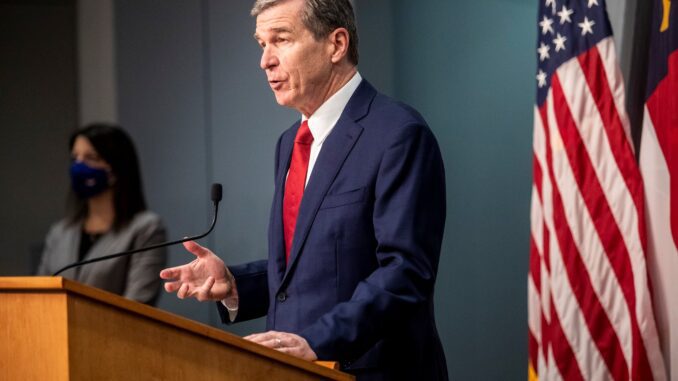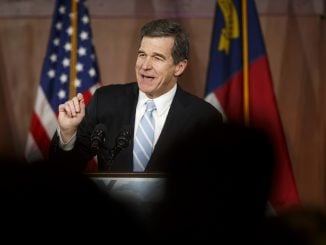
RALEIGH — On Monday, Nov. 1, Gov. Roy Cooper vetoed House Bill 26, the Emergency Powers Act, which would have required the governor to obtain Council of State approval on future state of an emergency orders lasting more than seven days and legislative approval to extend an order beyond 45 days.
“North Carolina is emerging from a global pandemic with lives saved and a strong economy because of effective statewide measures to protect public health under the Emergency Management Act,” Cooper wrote in his veto of the bill. “Critical decisions about stopping deadly diseases, or responding to any other emergency, should stay with experts in public health and safety, not a committee of partisan politicians. We must be able to act quickly and thoroughly when deadly diseases, hurricanes, or any other dangers threaten people’s lives and jobs. An emergency needs decisive, quick and comprehensive action, not bureaucracy and politics.”
Cooper vetoed the bill just hours before it would have become law without his signature. The veto is Cooper’s 65th since taking office, and he holds 65% of all vetoes issued by North Carolina governors.
It is not yet clear if lawmakers will attempt to override the veto. Since Republicans lost supermajority numbers in 2018, Democrats in both chambers have consistently voted to uphold Cooper’s vetoes.
Cooper’s statewide state of emergency for COVID-19 is contained in Executive Order 116, issued in March of 2020. The order has no expiration date, and the governor has repeatedly refused to say when he will rescind it.
Lawmakers responded, noting the veto comes as the order passes 600 days old.
“North Carolina remains in a state of emergency, now for a total of 600 days,” said House Speaker Tim Moore (R-Kings Mountain) in a statement. “During that time, many in our state have felt their individual liberties deteriorate under extreme mandates and policies as a result of unilateral decisions made by our governor in the midst of the pandemic.”
“I am disappointed that Governor Cooper is blocking a bill that simply allows for checks and balances, not just for him, but any governor, Republican or Democrat, in the future,” Moore said.
Rep. Keith Kidwell (R-Beaufort), the bill’s primary sponsor, said in a statement that Cooper’s veto is “putting power and politics over our constitution and what is good for our state.”
“The governor’s veto undermines our constitution, the balance of powers and the rule of law. It also further shows the dangers of when power is centralized in the hands of one person,” said Kidwell.
House Majority Leader John Bell (R-Wayne), who is also a sponsor of the bill, similarly said the governor’s veto of the bill “is purely about maintaining power and authority over the citizens and their elected representatives.”
“It does not matter who is governor of North Carolina. Republican or Democrat. The governor was never intended to have such absolute authority, especially for an unlimited time,” said Bell in a statement.
Sen. Bill Rabon (R-Brunswick) also chastised the length of Cooper’s emergency order, saying it highlighted the need for checks and balances.
“There is no emergency — none — that lasts for nearly two years. At that point, it’s no longer an ‘emergency’ — it’s the new status quo,” Rabon said. “Yet for 19 months the Governor has held onto every iota of unilateral authority he has. It’s unhealthy, unsafe, and undemocratic.”
“House Bill 264 would have instituted common-sense checks and balances on the Governor’s executive authority, instead of consolidating power into one office,” said Rabon. “Every passing day that the Governor refuses to relinquish his ‘emergency’ power is a day that harms our constitutional order.”
On Oct. 27, a reporter asked when the statewide emergency order would end, citing the 35% drop in cases and the 37% drop in hospitalizations. They posited that “we haven’t held a COVID briefing in over a month… it doesn’t sound like an emergency.”
Cooper responded that “We don’t have statewide mandates in place.”
He went on to say, “However, we are still using the emergency order to allow healthcare providers to do things they otherwise could not do under the law… and helping us draw down funds. So, that is still an important part of the process.”
As he has done in past months, the governor offered no details about what things healthcare providers are not able to do without a statewide emergency order nor did he elaborate on what funds required such an order.
Cooper’s Oct. 27 response is similar to the one he gave in June of this year when North State Journal questioned why he had not yet ended his statewide State of Emergency order.
“The State of Emergency needs to continue. We need to continue to draw down federal funds,” Cooper said on June 2. “We need to continue to do things to make sure people get vaccinated and we still have mask mandates in places that are recommended by the CDC.”
Just a few weeks later in mid-June, Cooper issued a press release justifying his refusal to terminate the State of Emergency. By that time, Cooper had received inquiries from lawmakers about ending his State of Emergency order.
“We cannot find any truth to his statement that we must be in a state of emergency to draw down federal funds or the other reasons listed in his latest executive order,” Bell wrote at the time in an email to North State Journal. “As is the case with hurricanes and other natural disasters, we can continue to use federal funding long after the state of emergency has ended.”
In their veto reaction statement, Bell and Kidwell noted Cooper still has not responded to their June 8 letter asking for more details and what “metrics and data” have to be met for his state of emergency to end.
Cooper’s release claimed that under a state of emergency, the state has “easier access to federal funding, including FEMA Public Assistance reimbursements, and schools can follow uniform safety guidance under the StrongSchoolsNC Public Health Toolkit.”
North State Journal looked into those claims and found that the CARES Act and President Biden’s American Rescue Plan (ARP) do not have a requirement for a state of emergency to be in place for a state to qualify for funding.
FEMA’s Federal Lost Wages Supplemental Payment Assistance includes language about the delivery and administration of funds for the program through a “major disaster” declaration under the Stafford Act. That major disaster declaration, however, is made by the president of the United States.



